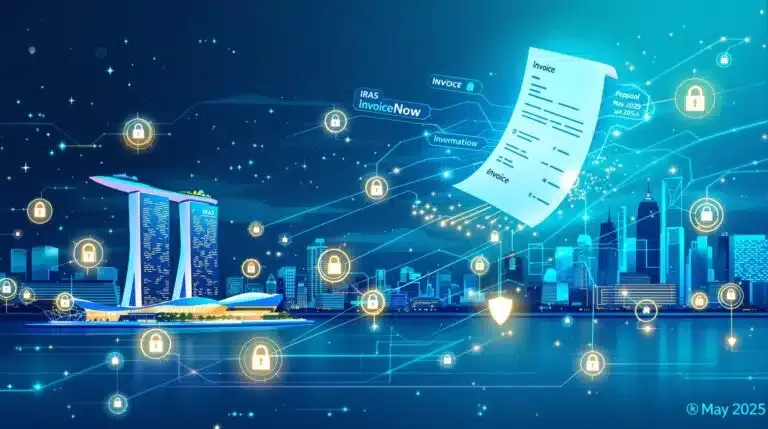
Singapore’s Digital Tax Shift
The IRAS InvoiceNow mandate marks a turning point in Singapore’s tax digitization. Starting 1 May 2025, the Inland Revenue Authority of Singapore (IRAS) will require GST-registered businesses to transmit invoice data electronically through the InvoiceNow (Peppol) network. Consequently, this change will impact how businesses manage their GST compliance.
This initiative aims to simplify GST reporting, automate compliance, and promote real-time visibility of business transactions. As a result, administrative costs and errors should significantly decrease.
Official Timeline from IRAS
The IRAS e-Tax Guide titled “Adopting GST InvoiceNow Requirement for GST-Registered Businesses (First Edition)” confirms the following implementation phases:
| Date | Phase / Applicability | Official Description |
|---|---|---|
| Soft Launch (Voluntary Phase) | All GST-registered businesses may voluntarily begin transmitting invoice data through InvoiceNow-Ready systems. | |
| Mandatory for Newly Incorporated Companies (Voluntary GST Registration) | New companies that voluntarily register for GST must issue and transmit e-invoices via InvoiceNow. | |
| Mandatory for All New Voluntary GST Registrants | All new voluntary GST registrants — regardless of incorporation date — must comply with the mandate. |
What Does the IRAS InvoiceNow Mandate Cover?
The InvoiceNow framework enables businesses to issue invoices in a structured Peppol electronic format instead of static PDFs. Consequently, it allows secure, real-time transmission between suppliers, buyers, and IRAS, ensuring accurate and traceable GST data.
In Scope
- Standard-rated supplies (excluding reverse-charge supplies)
- Zero-rated supplies
- Standard-rated purchases where input tax is claimed
Out of Scope
- Overseas entities (not GST-registered in Singapore)
- Reverse-charge transactions
- POS or petty-cash sales (can be aggregated before submission)
Why the InvoiceNow Mandate Matters
This digital shift provides both regulatory compliance and operational benefits. For instance,
- Automated GST reporting: Invoice data flows directly to IRAS.
- Reduced manual errors: Structured data minimizes human entry mistakes.
- Faster payments: Customers receive validated invoices instantly.
- Cost savings: Less paper handling and reconciliation work.
- Enhanced audit trail: Every invoice is uniquely identified and traceable.
Compliance Requirements: How to Meet the Mandate
To comply with the IRAS InvoiceNow mandate, businesses must:
- First, adopt an InvoiceNow-Ready solution certified by IMDA and Peppol.
- Next, issue structured e-invoices instead of PDF or paper invoices.
- Additionally, validate invoice data and obtain a Unique Invoice Identifier (UII) from IRAS.
- After that, store invoices and responses securely for audit purposes.
- Then, connect your ERP or accounting software with the Peppol network.
- Finally, follow IRAS protocols for corrections and cancellations.
How to Prepare for the May 2025 Launch
Preparation is key for a smooth transition. Therefore, consider the following steps:
1. Audit Your Current Systems
First, check if your ERP or accounting software supports InvoiceNow. If not, evaluate middleware integration options. [Transition phrase added]
2. Select a Certified Access Point Provider
Next, work only with IRAS-approved providers to ensure secure and compliant data transmission.
3. Integrate and Test Early
Use the voluntary phase (from May 2025) to conduct test submissions and resolve any system gaps.
4. Train Staff and Update SOPs
Make sure your finance, IT, and operations teams know how to issue, validate, and correct electronic invoices.
5. Stay Updated
Finally, keep monitoring IRAS announcements, as the mandate will expand over time.
Common Challenges and Solutions
| Challenge | Solution |
|---|---|
| Legacy systems without e-invoicing capabilities | Use InvoiceNow middleware or upgrade ERP software. |
| Large volumes of retail transactions | Aggregate petty-cash and POS invoices before submission. |
| Validation or data errors | Automate schema validation before transmission. |
| Staff unfamiliarity | Run internal training and dry runs. |
| Changing compliance scope | Follow IRAS updates regularly. |
Official IRAS Statement (Excerpt)
“A soft launch will commence from 1 May 2025. From 1 November 2025, newly incorporated companies that register for GST voluntarily will be required to transmit invoice data via InvoiceNow. From 1 April 2026, the requirement will apply to all new voluntary GST registrants.”
— IRAS e-Tax Guide: Adopting GST InvoiceNow Requirement for GST-Registered Businesses (First Edition)
The IRAS InvoiceNow mandate, beginning 1 May 2025, is a major step in Singapore’s digital tax journey. By embracing the Peppol e-invoicing framework early, businesses can ensure seamless compliance, speed up GST processing, and modernize their financial workflows.
Early adoption during the voluntary phase will give your company a competitive edge — turning compliance into efficiency.
Related Resources from Terra Advisory Services
-
📋 Our Services Overview
Explore all the services Terra Advisory offers — from compliance to accounting, tax, and more. -
🏢 Singapore Incorporation Services
Start and structure your Singapore company correctly from day one. -
📈 Mastering Accounting: Essentials of Assets & Payables
A guide to understanding the fundamentals of accounting for your business. -
🌐 Cross-Border Taxation
Insights into tax strategies and compliance for international operations. -
🧾 Ultimate GST Compliance Guide 2025
Deep dive into GST rules, registration, filing, and upcoming changes. -
📞 Contact Terra Advisory Services
Reach out to us for personalized support, consultancy, or setup assistance.
